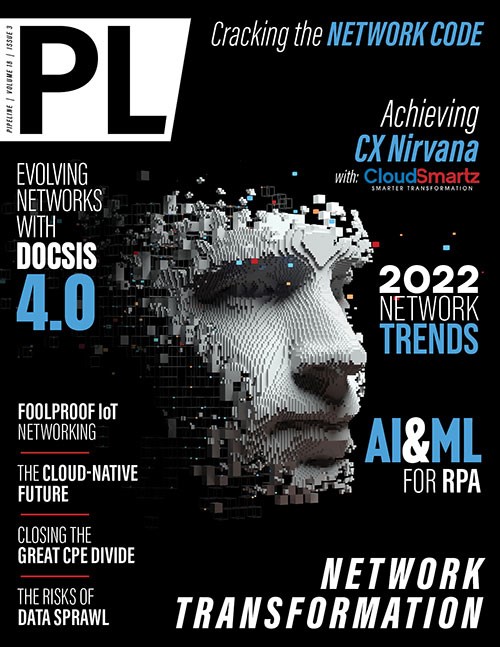By: Jitin Bhandari
Communications service providers (CSPs) keep being told to think of their networks in new ways, as everything from cloudified infrastructure to ecosystem platforms to value-creation engines.
Valid as these are, they don’t take the deconstruction (and reconstruction) of the network all the way to the finish line. To fully realize the potential of the 5G opportunity, it’s time to see the
network as code. The new use cases enabled by 5G range from richly personalized consumer services to radically customizable network slices tuned to the needs of specific industry verticals…
» read this article
By: Scott St. John - Pipeline
They just don’t make things like they used to. Somehow manufacturing shifted from building things to last, to building things as cheaply as possible, with an intentional and disposable end of
life in mind. The problem is things used to be better. They worked better. You could count on them. And replacing them now can be painful. I had this old, hand-me down coffee pot. The old, metal
1970s Farberware percolator. It brewed a near-perfect cup of coffee. Robust, and full flavored. It had a clear top so you could see when the brew reached the perfect caramel color…
» read this article
By: Chris Bastian, Curtis Knittle
Cable access networks are rapidly evolving to support present and future connectivity needs. As recently as the 1990s, a cable network provided only video entertainment to customers. Today, the
cable network provides fundamental connectivity to support a plethora of services including working from home, remote learning, telehealth services and, yes, is still the primary conveyance for
video entertainment. The pandemic has only heightened the need to evolve fast, reliable, and secure connectivity to stay well ahead of the demand from these various classes of service…
» read this article
By: Natasha Tamaskar
The pandemic has changed how we live, work, and play as many of our day-to-day activities have moved online and we are now more reliant on broadband connectivity than ever before. To keep up,
our home networks must meet new bandwidth demands driven by a proliferation of users and devices all connecting during peak hours. At the same time, the pandemic showed that industries that had
already digitalized—think finance, entertainment, and retail—were best equipped to meet the demands of the pandemic…
» read this article
By: Shane Sura
Modern telcos have allowed themselves to build a complicated web of back-end systems designed to monitor and maintain their infrastructure. It was an age-old trap in which they believed that
they could better manage these new network components by just adding another system. Instead, they just built even more complexity, limited decision-making, and made incremental work for themselves
in the customer experience department. Now, a complete shift is needed at the network operations layer to both evolve the network system architecture and modernize it while also improving
monitoring and performance functions…
» read this article
By: Tomer Lavie
What will cellular look like five or 10 years from now? Which of today’s network technologies will be riding off into the sunset? Which emerging ones will be as mainstream as 4G is today? And
how might operator business models change? These are the kinds of questions that can mean sleepless nights for CIOs, line-of-business heads, business development VPs and anyone else responsible for
their organization’s IoT strategy. One scenario is a mobile operator suddenly phasing out a technology much sooner than the marketplace expected — a nightmare that sometimes comes true…
» read this article
By: Reed Peterson
The telecom sector is in the midst of making some serious bets about the future. The advent of the pandemic forced many companies, telecom operators included, to speed up their digital
transformation initiatives. According to TM Forum’s Digital Transformation Tracker, the number of operators that said they were midway through their implementations jumped from 23 percent in 2020
to 38 percent in 2021, while 42 percent had started their moves. In total, 80 percent of companies are going through major changes today…
» read this article
By: Jason Moore
Over the last two decades, we’ve watched the world adopt a digital-first mindset. Once a luxury, the Internet is now a necessity. And while we were well on our way to a more connected universe
before the pandemic, COVID-19 forced us to adapt to a new era of home offices, remote education, and video meetings—all of which placed additional strain on in-home networks. During this
adaptation, residential Internet usage skyrocketed, and domestic Internet Service Providers (ISPs) had to shoulder the burden of supporting this heavy usage…
» read this article
By: Kevin Johnson
We know data is king for companies worldwide, so in the age of remote work, hybrid IT environments, and the Internet of Things, how can we keep it protected and easily accessible? Most
companies have a vast network of apps and devices that are constantly collecting and storing data for employees to access, analyze, and leverage for their everyday operations. This network is
growing exponentially and in a more distributed fashion. According to Gartner, three-fourths of all enterprise-generated data will be generated beyond the centralized data center or cloud by
2025—up from only about 10 percent in 2018…
» read this article
By: Jara Kern, Pipeline
Hybrid mall shopping experiences by 2030. Smart city trials to measure (and eventually address) noise pollution. Customized digital content experiences. Intelligent transport networks with
AI-enabled digital road twins. These tantalizing headlines aren’t the future—they’re our present, and they’re just a few of the headlines we’re bringing to you this month in our telecom industry
news roundup. The top telecom industry news stories from the month are summarized below. To view all the news as it breaks, check out Pipeline’s News Center or subscribe to receive our telecom
industry news summary…
» read this article
By: Scott St. John - Pipeline
The New Year is burgeoning with optimism. I mean, how much worse can it get? For many, including those in and close to the Pipeline family, the year started with a harsh surprise that the
COVID-19 vaccines actually don't prevent you from getting or transmitting COVID. Which, if you’ve been reading my letters, shouldn’t really come as a surprise at all. In my March 2021 letter,
I raised that very question. In August 2021 and September 2021 I raised the issue again when an alarming number of break-through cases began to emerge among fully vaccinated groups and
individuals…
» read this article


















